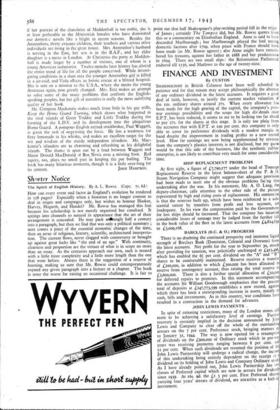FINANCE AND INVESTMENT
By CUSTOS
SHAREHOLDERS in British Celanese have been well schooled M patience and for that reason may accept philosophically the absence of any ordinary dividend in the latest accounts. It requires a good deal of faith, however, to justify the current market valuation of the Jos. ordinary shares around 275. When every allowance has been made for the high gearing of the capital, the company's post- war earnings possibilities and the scope for high divTdends once E.P.T..has been reduced, it seems to me to be looking too far ahead to pay 27s. for the shares at this stage. It is only too plain from the accounts that with E.P.T. at too per cent. this company is only able to cover its preference dividends with a modest margin in hand despite the improvement in trading profits to a new record level. How far earnings are now being supplemented by revenue from the company's plastics interests is not disclosed, but my guess would be that this side of the business, like the synthetic rubber enterprise, is not likely to contribute very much for some considerable time.
SHIP REPLACEMENT PROBLEMS At first sight, a figure of L7,790,177 under the head of Tonnage Replacement Reserve, in the latest balance-sheet of the P. & 0. Steam Navigation Company might suggest that adequate provision had been made to meet one of the obvious problems fac:ng this undertaking after the war. In his statement, Mr. A. 0. Lang, the deputy-chairman, calls attention to the other side of the picture represented by high and rising costs of replacement. His content:on is that the reserves built up, which have been reinforced to a sub- stantial extent by transfers from profit and loss account, are inadequate. In his view the compensation paid by the Government for lost ships should be increased. That the company has incurred considerable losses of tonnage may be judged from the further fall in the book value of the fleet in the latest accounts from 44,824,839 to £3,009,168.
BARCLAYS (D.C. & 0.) PROGRESS
There is no doubting the continued prosperity and immense liquid strength of Barclays Bank (Dominion, Colonial and Overseas) from the latest accounts. Net profit for the year to September 30, struck after providing for taxation, was prActically unchanged at £415,498, which has enabled the 61- per cent, dividend on the "A" and " B " shares to be comfortably maintained. Reserve receives a transfer of Lzoo,000, in addition to which £3oo,00o has been allocated to reserve from contingency account, thus raising the total reserve to £3,600,000. There is also a further special allocation of £50,000 for deferred repairs to premises. In this statement accompanying the accounts Sir William Goodenough emphasises that the present total of deposits at £247,773,599 establishes a new record, against which there has been a corresponding increase in assets, mainly in cash, bills and investments. As in this country, war conditions have resulted in a contraction in the demand for advances.
JOHN LEWIS PAYMENTS.
In spite of rationing restrictions, many of the London stores still seem to be achieving a satisfactory level of earnings. Further recovery is certainly implied in the decision announced by John Lewis and Company to clear off the whole of the outstanding arrears on the 7 per cent. Preference stock, bringing matters up to January 31, 1944. The way is now opened for a resumption of dividends on the £9oo,000 of Ordinary stock which in pre-W31 years was receiving payments ranging between 8 per cent. and 12 per cent. When such dividends are resumed the position of the John Lewis Partnership will undergo a radical change, the income of this undertaking being entirely dependent on the receipt of a dividend on its holding of John Lewis and Company Ordinary stock. As I have already pointed out, John 'Lewis Partnership has tal classes of Preferred capital which are now in arrears for dividend since 1939. At p5s. 9d. the Li 5 per cent. First Preferred sharei carrying four years' arrears of dividend, are attractive as a lock-UP investment.


























 Previous page
Previous page